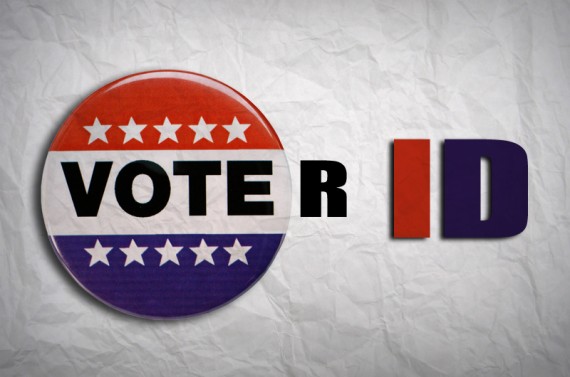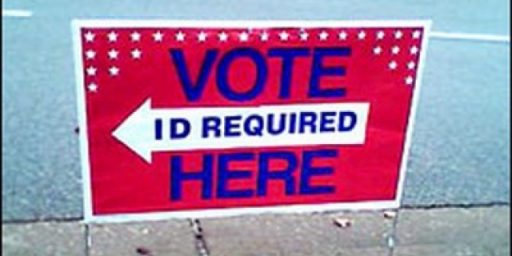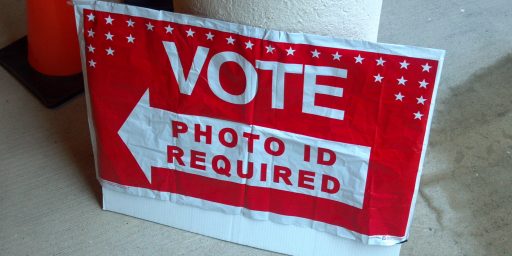Three Judge Panel Upholds South Carolina Voter ID Law, Delays Implementation
A victory for advocates of Voter ID laws in a Washington, D.C. Federal Court.
A three judge panel in Washington, D.C. has upheld South Carolina’s Voter ID law against the challenges filed by the Department of Justice, but has order that the law not go into effect until after the 2012 election:
WASHINGTON—A panel of three federal judges on Wednesday upheld a South Carolina law requiring voters to show photo identification but delayed implementation until next year.
In a unanimous ruling, the judges said there was no discriminatory intent behind the law and that it wouldn’t diminish African-Americans’ voting rights, because people who face a “reasonable impediment” to getting an acceptable photo ID can still vote if they sign an affidavit.
The judge declined to let the law take effect immediately, “given the short time left before the 2012 elections and given the numerous steps necessary to properly implement the law…and ensure that the law would not have discriminatory” effects. The U.S. presidential election is on Nov. 6.
South Carolina voters who now lack the proper photo ID are disproportionately African-American, so proper and smooth functioning of the law “would be vital to avoid unlawfully racially discriminatory effects,” according to the decision, written by Judge Brett M. Kavanaugh of the U.S. Court of Appeals for the District of Columbia Circuit. “There is too much of a risk to African-American voters for us to roll the dice,” he said.
South Carolina is one of 16 states, mostly in the South, where election laws are subject to Justice Department approval under the federal Voting Rights Act because of a history of discrimination. South Carolina’s was the first law to be refused federal approval in nearly 20 years, which led state officials to challenge that decision in federal court.
In it’s examination of the effect of the law in light of the concessions made by South Carolina, the Court states this:
The reasonable impediment provision thus operates similarly to a requirement that the voter without photo ID simply sign an affidavit stating that the voter is who he or she says. That’s noteworthy, because the Department of Justice has concluded that requiring such affidavits does not pose a material burden on the right to vote for Section 5 pre-clearance purposes. See Letter from T. Christian Herren, Jr., Chief, Voting Section of Civil Rights Division of U.S. Department of Justice, to J. Gerald Hebert and Stephen B. Pershing (Sept. 4, 2012) (pre-clearing New Hampshire’s voter ID law, which requires an affidavit from voters without photo IDs). Indeed, some opponents of strict photo voter ID laws have proposed such affidavits as an alternative to strict photo voter ID requirements. See America Votes Act, H.R. 6419, 112th Cong. (2012) (proposed bill permitting eligible voters to sign an affidavit if they do not have a state-required ID). It turns out that, as authoritatively interpreted, South Carolina’s reasonable impediment provision strongly resembles the kind of affidavit requirement that the Department of Justice has agreed would not materially burden the right to vote.
It is true that citizens who vote with non-photo voter registration cards will cast provisional ballots, not regular ballots. But the word “provisional” is a bit of a misnomer in this instance. These ballots must be counted and will be counted, at least so long as the voter does not lie when he or she fills out and signs the reasonable impediment affidavit. Counting the reasonable impediment ballots will not differ in substance from the counting of absentee ballots. When the provisional ballot process operates in this way, casting a provisional ballot instead of a regular ballot does not burden the right to vote. See Florida, 2012 WL 3538298, at *33-38.
And on the issue of discriminatory intent, the Court said this:
When they debated and enacted Act R54, South Carolina’s legislators and Governor no doubt knew, given the data obtained from the State Election Commission, that photo ID possession rates varied by race in South Carolina. Under Feeney, legislators’ knowledge of the law’s potential disproportionate impact does not alone equate to discriminatory purpose. See Feeney, 442 U.S. at 279. But under Arlington Heights, ongoing legislative action with the knowledge of such an impact might be some evidence of discriminatory purpose, depending on the other facts and circumstances. See Arlington Heights, 429 U.S. at 266. Here, we do not need to thread that analytical needle because, critically, South Carolina legislators did not just plow ahead in the face of the data showing a racial gap. Presented with that data, South Carolina legislators did not force everyone to obtain a photo ID in order to vote. Instead, South Carolina legislators – led by Republican Senator and now Lieutenant Governor Glenn McConnell and Democratic Senator John Land, who, according to the evidence, are well-respected in the Assembly by African-American legislators and white legislators, Republicans and Democrats - made several important changes to the bill. Among those changes was the addition of the sweeping reasonable impediment provision, which as interpreted by the responsible South Carolina officials ensures that all voters of all races with non-photo voter registration cards continue to have access to the polling place to the same degree they did under pre-existing law.10 The legislators also permitted three new forms of qualifying photo IDs on top of the two already permitted under pre-existing law. And the legislators made it easier to obtain a qualifying photo ID: They created a new free photo voter registration card and made DMV photo ID cards available for free. And the legislators mandated a variety of education and outreach efforts to inform voters, poll managers, and county officials about the law’s effects. Those many provisions significantly undermine any suggestion that Act R54 was enacted for a discriminatory purpose.
Finally, on the issue of implementation before the 2012 elections, the Court said this:
We have emphasized the importance of the reasonable impediment provision to our analysis of Act R54 and to our pre-clearance of Act R54 for future elections. But a large number of difficult steps would have to be completed in order for the reasonable impediment provision to be properly implemented on November 6, 2012. In the course of just a few short weeks, the law by its terms would require: that more than 100,000 South Carolina voters be informed of and educated about the law’s new requirements; that several thousand poll workers and poll managers be educated and trained about the intricacies and nuances of the law, including about our decision here today; and that county election boards become knowledgeable of the law, including of our decision here today. New forms need to be created, and notices posted and mailed, among other things.
The text of Act R54 strongly suggests that those steps cannot be completed in the short time before the 2012 elections. The South Carolina legislature established several deadlines for education and training that indicated the legislature’s belief that implementation of the law would occur over the course of about 11 months. Under the law, the State Election Commission had to provide individual notice to registered voters without a DMV-issued ID “no later than December 1, 2011.” Act R54, § 7(8). The Commission had to place informational notices in South Carolina newspapers “no later than December 15, 2011.” Id. § 7(6). And the Commission had to coordinate with county boards and conduct at least two training seminars in each county”prior to December 15, 2011.” Id. § 7(4). Because the law had not been pre-cleared before now, South Carolina has not initiated any of those steps. The statute’s own requirements that education and training begin nearly a year before the first elections under Act R54 strongly suggest that those steps cannot be adequately completed in just four weeks.
Furthermore, the reasonable impediment provision is new, and it will likely require some explanation to poll managers and poll workers, and to county officials. With under four weeks left to go, the potential for chaos is obvious. In that regard, we note that South Carolina officials - while gamely and admirably saying they will try to get the job done no matter what – have previously told the Court that this is far too late a date for the law to be properly implemented.
It strikes me that the Court got things largely correct here. With the understanding as to how the law is going to be implemented and enforced, it now seems fairly clear that fears that the law would disenfranchise people without valid identification seems largely unwarranted. If someone shows up to a South Carolina voting place without one of the forms of identification required under the law, they will simply be asked to sign an affidavit verifying that they are who they claim to be after which they will be able to cast a Provisional Ballot that, by law, must by counted equally with other ballots. That seems like a reasonable workaround to me. Additionally, given the act that the law includes many methods for people to obtain a valid ID, along with the “reasonable impediment” provision, strongly undercuts the idea that the law had a discriminatory purpose when passed. Indeed, if that was the case, then they would have made the law far stricter than it actually is, and made it harder for people without identification to cast a valid ballot. Since that isn’t the case, there simply wasn’t enough evidence to strike the law down on the ground that it had a discriminatory intent.
Finally, I think the Court was largely correct to delay implementation of the law so that it doesn’t go into effect until after the election. For one thing, with only twenty-seven days to go until the election itself, it seems impossible for the state to be able to fully implement that law without likely causing problems for people who don’t have identification. Had this decision come earlier in the year, then this likely would not have been a problem, but as the opinion notes the trial ended up taking far longer than anticipated. The other advantage to delayed implementation, of course, is that it gives the state and voters time to get used to the law and work out any kinks in the procedures before serious national elections take place. There don’t appear to be any major statewide elections on the calendar in South Carolina in 2013, so this would be a good opportunity for a “test run” of sorts before the national mid-term and statewide legislative and Gubernatorial elections the following year. Moreover, since South Carolina is a solid red state in Presidential elections, there’s really no reason to disrupt the process this year.
On the whole, notwithstanding delayed implementation, this can be counted as a victory for the Voter ID movement. Unlike the Texas law, which was struck down by another three-judge panel in August but is likely going to be appealed to the Supreme Court, this is a clear victory on Voting Rights challenges that is likely to be helpful for other states wishing to implement similar laws. If they’re willing to make the concessions South Carolina did, their laws are likely to pass muster.





@Doug Mataconis:
This gives people two years until the next major election to inform voters about the law and make sure that people can easily get a Voter ID, so that’s a major blow for the movement.
I mean, there’s a reason why Republicans are pushing for these laws now, for this election.
@PJ:
If people comply with the law then the law has served its purpose
@Doug Mataconis:
If Republicans actually cared about voter fraud, then they would have targeted absentee ballots.
These laws would serve their intended purpose if they depress Democratic turnout. So, for this election, that’s a loss for Republicans in South Carolina.
@Doug Mataconis:
Voters were in compliance 99% of the time before the law existed. Which begs the question – why is the law neccessary?
@Doug Mataconis: If a person wants to cast a fraudulent vote, all he has to do is sign an affadavit, which is hardly a greater fraud than the original one. How does this law stop a single criminal from voting illegally? Now granted, no one has ever managed to document that this is an actual problem anywhere, but that aside, this law does nothing to stop the fraud. So it’s a non-solution to a non-problem — what’s the point?
Sure, technically it’s a “win” for your side — but what has anyone actually won here?
@Doug Mataconis:
The same could be said about a law in New York banning the sale of large sodas…
@LaMont:
That’s not an appropriate question for Courts to decide.
@Doug Mataconis: It’s not for the courts to decide if a law is necessary or not BUT a law passed with absolutely no need waves a big red flag for judicial review for its possible consequences (intended or otherwise).
Sadly Woody Jenkins, Slade Gorton, Norm Coleman, Dino Rossi and John Ashcroft all were unavailable for comment.
Speaking of which, one of the most surreal aspects of this asinine debate — and effete liberals living in McMansions in gentrified neighborhoods never would be able to grasp the irony — is that if someone wants to file for welfare they need to show an official government photo ID. People who want to claim unemployment insurance benefits need to show ID. To claim Social Security, SSI, SSDI or Medicare benefits, uh yeah, you need to show ID. Medicaid too. Food stamps. Kin care. WIC. Hell, everything requires ID if you’re looking for assistance from the gumbmint. Somehow all of these tens of millions of people out there on assistance programs manage, you know, to obtain ID. Duh.
But if someone suggests that people should show ID to vote then the left wing instantly will jump into hysterical high dudgeon mode and will fight tooth and nail until the end of time. Proving yet again that when you really think about it leftism is a mental disorder, not a political ideology.
First of all, I don’t have direct experience with most of those things, but I can tell you that I never had to show any ID whatsoever to obtain unemployment benefits in MA. As a matter of fact, I never had to go see anyone or leave my house to file initially, renew each week, or file extensions. I would imagine that a great many of those government-provided services are now set up the same way, and you can do most of it over the phone or online. But that is just a nitpick and is beside the point.
None of those things are fundamental constitutional rights, which voting most certainly is. That’s why its a bigger deal. And that’s why doing anything that will have any effect whatsoever that even has a possibility of disenfranchising people should be met with extreme amounts of skepticism. And evidence that there is some sort of real problem we are attempting to fix in this entire process.
I propose that citizens should have to present a photo ID and not be able to hide behind pseudonyms before they make dumb azz remarks.
(I have been known to be a wise azz or a smart azz but never a dumb azz so my rule will not apply to me.)
@Tsar Nicholas: Do you need a picture ID to receive your Social Security check? I doubt it.
You may though, once the gov’t stops sending paper checks next year and recipients are forced to open bank accounts to get their checks direct deposited. Not sure how they will handle recipients who have no gov’t issued photo ID in that case. It’s one thing not to let them vote, quite another to withhold their SS checks from them.
@Doug Mataconis:
Given that a fundamental question the Court did have to answer – Was there discriminatory intent? – is clearly impacted by the reasons the law was passed, I would suggest that understanding why the law was passed is pretty central.
My disabled relative, who has no driver’s license since she can’t drive, doesn’t have a government photo ID. She does receive Medicaid and food stamps, both of which she applied for using her birth certificate and social security card. Her local bank knows her by sight and has never asked for anything but a signature to access her bank account to draw on her Social Security disablility payment.
It may be different in other states but where she lives she doesn’t need a picture ID to live her life. Getting to the DMV would probably cost her a week’s worth of food money not to mention the physical discomfort of standing in line for a few hours.
@Doug Mataconis:
Thanks for so clearly elucidating your conservative, libertarian take on how our laws should be crafted.
@Doug Mataconis: “If people comply with the law then the law has served its purpose ”
No. As admitted openly in Pennsylvania, and as proven in WI when DMV offices were selectively closed, and as proven in Ohio when voting hours were restricted.
And that’s just the ones I know about.
@Doug Mataconis: “That’s not an appropriate question for Courts to decide. ”
Now you’re switching from ‘the law served its purpose’ to what matters a court may deal with.
What will be interesting is if the powers that be now sit on this “allowance” until 3 months before the next election, then run around pretending to implement getting photo IDs into everyone’s hands.
The fact that there are some hard dates in the statute by which X has to get done helps against this. But what happens if the deadlines aren’t complied with? Does the whole thing lapse, or do they get another chance at implementing the Photo ID requirement the next election down the road?
If they really wanted to implement this quickly, what they would do is combine voting this election around with getting the photo ID created on the spot. I don’t see the necessity of making everyone go to the DMV–why not load up a few trucks with the necessary equipment and drive to the polling places?
@grumpy realist: ” I don’t see the necessity of making everyone go to the DMV–why not load up a few trucks with the necessary equipment and drive to the polling places? ”
Are you really asking?